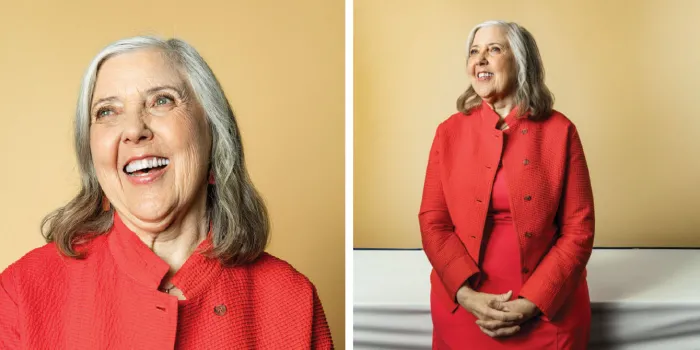On the first day of her pediatric internship at San Francisco General Hospital, Marion Koerper, MD, noticed a 4-year-old boy “running around with cotton in his nose and his arms wrapped in elastic bandages so tight he couldn’t bend his elbows,” she recalls. Staff in the pediatric ward explained that the child had hemophilia; the wrappings prevented nose-picking—the cause of frequent nosebleeds and doctor visits.
Koerper, whose interest in hematology was sparked early in medical school at the University of California, San Francisco (UCSF), offered to become his primary care doctor—and suggested freeing his arms “so he could play like a normal little kid!” It was the early 1970s, when clotting factor was not yet widely used in the routine care of people with bleeding disorders. “He was my first hemophilia patient,” she says, recounting the experience in vivid detail. “Every time he came to the clinic for a bleeding episode, the clinic would page me and I would see him.”
That chance encounter launched what would become a nearly 50-year career in pediatric hematology. In addition to clinical work, Koerper taught pediatric hematology at UCSF and in 1977 became the inaugural director of the UCSF Hemophilia Treatment Center—one of the earliest HTCs in the United States—a position she held until 2016.
Koerper’s commitment to the bleeding disorders community has extended far beyond the clinic, the laboratory and the classroom. A member of the National Hemophilia Foundation (NHF) since 1976, she joined her local chapter, the Hemophilia Foundation of Northern California, the following year. Among many other contributions to the chapter, she was instrumental in creating its summer camp (later named Camp Hemotion) in 1978. Koerper was the camp’s medical director for the next 38 years, a role she says was pure delight. “Kids lined up in the morning for prophylaxis and spent the day swimming, climbing and hiking,” she says. “Children as young as 5 learned how to mix factor and give themselves injections. Every kid should go to summer camp; it’s too much fun to miss out on.”
Koerper’s bleeding disorders advocacy also encompassed much darker chapters in the community’s history. Witness to the terrible toll the HIV/AIDS crisis of the 1980s had on people with bleeding disorders and their families, Koerper was among those who successfully advocated for new procedures to monitor and ensure the safety of the US blood supply. “People were exposed to the virus through clotting factor from contaminated blood,” she explains. “We lost a generation of people with hemophilia to AIDS.” She remained vigilant in advocating for blood safety, including as co-chair of NHF’s Blood Safety Working Group.
Over the years, Koerper has held numerous positions at NHF that allowed her to improve the care of people with bleeding disorders. She was a member of the foundation’s Standards and Criteria Committee and chair of the Medical and Scientific Steering Committee. She joined NHF’s Medical and Scientific Advisory Council in 1987 and was vice chair from 2001 to 2018. In that role, she was instrumental in the committee’s development of standards of care recommendations used worldwide, including for treatment of people with bleeding disorders in emergency rooms, at-home patient dosing of clotting factor, and the treatment of girls and women with inherited bleeding disorders. From 2011 through 2018, she was NHF’s medical adviser, focusing on patient advocacy, education, standards of care and the genetics of bleeding disorders.
Despite retiring from clinical practice in 2016 for health reasons, Koerper continues to serve the bleeding disorders community as a member of the World Federation of Hemophilia’s (WFH) Coagulation Products Safety, Supply and Access Committee. She was also the medical director of the treatment room at the 2016 WFH World Congress in Orlando. And she recently returned to Camp Hemotion to help celebrate its 40th anniversary. “I loved my work. I loved everything I did. I put my heart into the hemophilia community,” she says.

